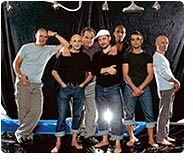|
|
 |
 The TChorba Soup of Les Yeux Noirs:Yiddish and Romani Music Hits Smoky Cellars, Churches, and Biker Clubs
The TChorba Soup of Les Yeux Noirs:Yiddish and Romani Music Hits Smoky Cellars, Churches, and Biker Clubs
Les Yeux Noirs’ name comes from a French translation of Ochi Chornya, (Black Eyes) an old Russian Roma (Gypsy) tune that was an international hit for the iconic Manouche (French Roma) jazz guitarist, Django Reinhardt. The septet was founded in the early 1990s after the Slabiak brothers, Eric and Olivier, who are both classically trained violinists, fell in love with their own ancestral Yiddish folkways. Further digging revealed that European Jewry and the Roma people had not only endured parallel travails of persecution and displacement at the hands of the same host cultures (including near-extinction at the hands of the Inquisition and the Nazis and these days, increasing violence against the Roma in Eastern Europe), but had been actively influencing each other’s music for centuries. Hundreds of vibrant and innovative hybrids sprang up wherever these groups intersected. The Slabiaks were inspired to seek out some of the finest acoustic players available and embark upon a journey of discovery. Six albums and numberless tours later, they are universally acknowledged as premier modern champions and celebrants of two inextricably intertwined, long-endangered but ultimately triumphant legacies.
Les Yeux Noirs have widened their original base out of the comfortable networks of cultural centers and theaters, conquering new venues worldwide: reggae, jazz, and classic festivals; California biker clubs; churches; and smoky cellars… Meeting these different audiences, the band has fulfilled its dreams and revealed its multiple facets.
Their brand new album tChorba (“soup”) on World Village (Harmonia Mundi) is made up of these contrasting experiences. It gathers various ingredients that were recorded, co-produced, and mixed by the colorful Stuart Bruce (Frankie Goes to Hollywood, Paco de Lucia, John McLaughlin, Al di Meola, Amadou & Maryam, Susheela Raman, Nusrat Fateh Ali Khan, etc.)
"TChorba is a soup, a Turkish soup made with a lot of good things," Eric Slabiak explained to the Maui News recently, on a tour in Hawaii. "In France, when you say tChorba it’s a pejorative. There are a lot of ingredients so we hope it's a good soup. It's different: we play a little bit funky on one tune and we have a lot of samples. It's the album we prefer. We are very excited about it."
Self-produced by the band for the first time, this album includes some songs in French as well as rich and heady atmospheres.
"Our culture is Eastern European, Jewish, Gypsy music, but we also grew up with Supertramp and David Bowie and rock music,” Slabiak continues. “We wanted to include both sounds. The audience can see this is just not old music, it's evolving and maturing. I think it's necessary for this music to cross the centuries."
Given the sources involved, it is not surprising that most of the tracks on this album originated in Eastern Europe or from the still-flourishing Manouche scene, but virtually everything else is unexpected in one way or another. A consort of instruments, both traditional and not-so traditional, including violins, cello, double bass, accordion, guitar, keyboards, cimbalom (hammer dulcimer), drums, and percussion are given a propulsive thrust by judiciously applied touches of cutting-edge programming and samples. The lyrics, sung in Yiddish, Romani, and French, express love as experienced by a man and woman but especially, between parent and child; also bitterness in old age, estrangement, and always lurking just beneath, the theme of wandering, as constant metaphor or imminent reality, whether in the past, looming on the morrow or running in the blood. The album is resonantly soulful, sometimes mordantly funny and almost always compulsively danceable—even the ballads hit the hips as well as the heart. But each song is underpinned by a fugitive strand of melancholy that imbues even the most manic melody with the import of indestructible race memory, a cumulative gift bestowed by uncountable anonymous and unsung musical lives.
|
|
 |
|
|
|